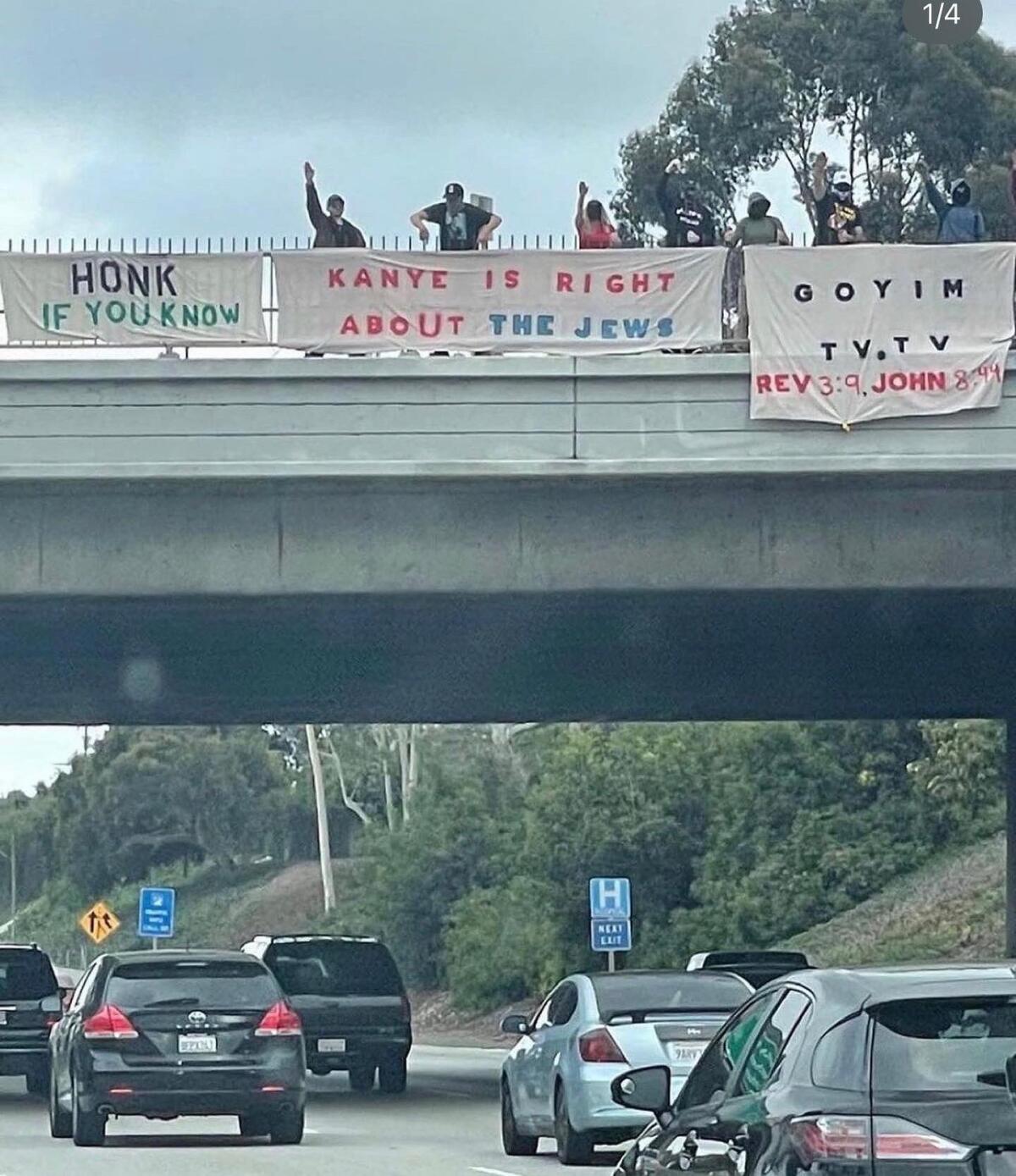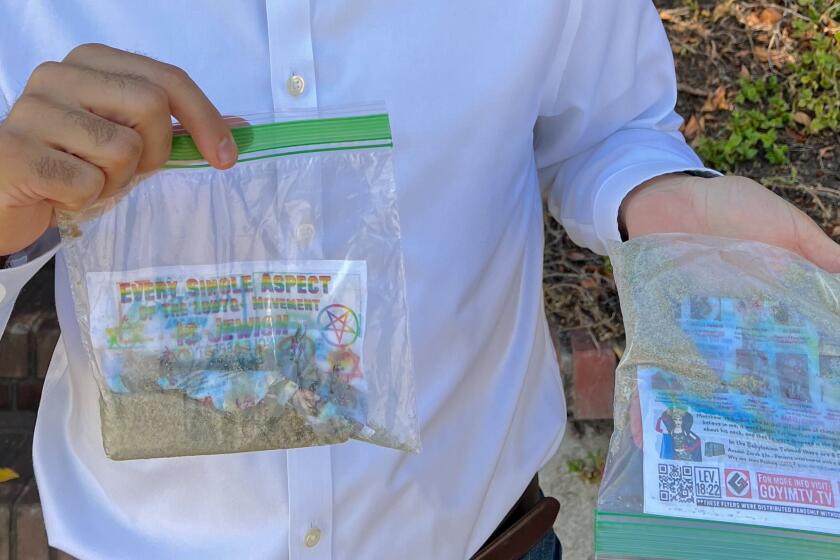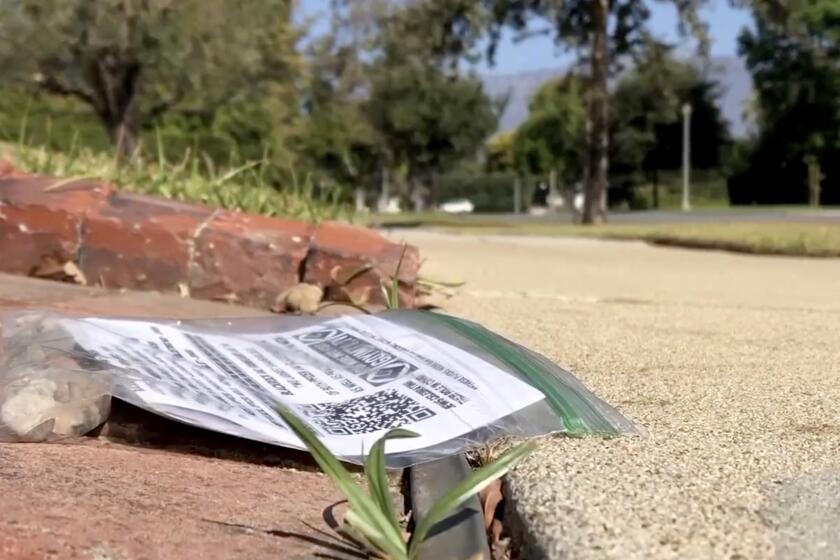We rarely prosecute bigots and racists who spew hate speech. And rightly so

- Share via
In March, a woman dressed all in black like a Nazi SS officer and wearing a swastika armband got into an altercation with several local residents of Laguna Woods.
They tried to get her to remove the armband and she began shouting antisemitic comments. The Orange County Sheriff’s Department, which was at the scene, recommended to the district attorney’s office that she be charged with several crimes.
But nothing happened. For weeks and then months, officials at the D.A’.s office told me they were still reviewing the case. Finally when I asked last week, a spokeswoman acknowledged that the office had dropped it “for lack of sufficient evidence to prove a crime had been committed.”
Similarly, when antisemitic fliers began appearing on Westside doorsteps and then in Pasadena, Beverly Hills and elsewhere, law enforcement quickly became involved. Last month, the Los Angeles Police Department said its Major Crimes Division was “aggressively investigating” and would “pursue every avenue to identify and prosecute” those involved.
Opinion Columnist
Nicholas Goldberg
Nicholas Goldberg served 11 years as editor of the editorial page and is a former editor of the Op-Ed page and Sunday Opinion section.
But if I had to guess, I’d say that not much will come of that case either. And if some charges are brought they’ll be for trespassing or disturbing the peace or some such tangential crime — not for the hate speech itself. Same goes for the people who unfurled the “Kanye is right about the Jews” banner above the 405 Freeway in October.
Now perhaps you think I should express outrage at law enforcement’s inaction in the face of vicious, hurtful, intimidating bigotry. But I’m not going to. In fact, I think, on balance, that it’s a good thing that we as a society have made it very difficult to prosecute people who engage in hateful speech.
“Congress shall make no law … abridging the freedom of speech,” says the 1st Amendment. That’s our bedrock principle: We don’t toss people in prison for saying even the most offensive, bigoted or politically indefensible things.
That’s why law enforcement’s hands are often tied.
Of course free speech is not absolute, nor should it be. Government can prosecute people for expressing “true threats” or “fighting words” or for “incitement to imminent lawless action,” among other things.
Fears that antisemitic remarks by Kanye West would spur additional bigotry came to fruition in Los Angeles on Saturday.
But for the most part, speech and expression — including marching around wearing swastikas and waving racist banners and tweeting or podcasting hateful sentiments — are broadly protected.
“Generally speaking, the law protects expression of all viewpoints, including offensive ones,” says UCLA law professor Eugene Volokh. “The chief reason is that the legal system doesn’t trust the government — or even the courts — to decide what’s offensive enough to be banned and what is not.”
Some people think that’s a cop-out.
We regulate other forms of expression, they say, such as obscenity, incitement, libel and false advertising. So why shouldn’t we also regulate hate speech? No societal good is served by letting Nazis and Klansmen march down our streets protected by the police. Given that this is a time of rising racism and antisemitism, they say, perhaps we should rethink 1st Amendment “fundamentalism” and impose some rational limits.
I disagree. I come down on the side of more speech, not less speech.
The reason the American Civil Liberties Union defended the right of Nazis to march through a Jewish neighborhood in Skokie, Ill., in 1978 is that it understood that if you don’t defend free expression when it’s used by abhorrent people with repugnant beliefs, then it won’t be there for you when you need it.
If Nazis are banned today, communists could be banned tomorrow and democratic socialists the next day. Or Democrats, for that matter.
Fliers with antisemitic messages were left near homes, apparently at random, in San Marino and Pasadena, police said.
Here’s a historical example that’s less hypothetical: In the 1949 case of Terminiello vs. Chicago, the ACLU argued in defense of a former Catholic priest who’d given a speech that was both racist and antisemitic. But that case created a precedent that later formed the basis for the ACLU’s defense of civil rights demonstrators in the 1960s.
“Free speech rights,” as the ACLU put it, “are indivisible.”
When speech is restricted, it is often at the expense of the weak, unpopular, poor or marginalized, as well as those who dissent from mainstream views. During the civil rights movement, who do you think was arrested for unlawful assembly and for “distributing literature without a license” or for making “statements calculated to breach the peace”? Hint: It wasn’t the Ku Klux Klan.
Hate speech isn’t harmless. It can be painful and damaging in its own right, and it often reflects rising hatred in the community that needs to be closely monitored and publicly renounced.
And few would deny that there’s a connection between hate speech and hate crimes, including violent crimes.
The watchdog group StopAntisemitism said it had identified two people who drove a rented box truck displaying hateful messages.
In the last few years, the incidence of hate crimes across the country and in California has been rising, led, in 2020, by an increase in anti-Asian crimes. What’s more, a USC report suggests that in the first six months of 2022, hate crimes against Black, transgender and LGBTQ Angelenos were up significantly compared with the same period in 2021. And an Anti-Defamation League report found that antisemitic incidents nationally reached an all-time high in 2021.
These are tense, frightening times, with tensions running high. Polls show that about 20% of us from both political parties agree or strongly agree that political violence can be acceptable. The antisemitic incidents in Laguna Woods, Beverly Hills and elsewhere are deeply disturbing.
But the solution cannot be to arrest or prosecute people for expressing ideas and opinions. The United States rightly allows people to wear shirts saying “F— the draft” and to burn the American flag. It also lets them ridicule other people’s religions. And it permits the expression of hateful points of view.
We should fight hate crimes, but when it comes to hate speech, our best weapon is more intelligent, more humane speech.
It is in tense times like these that our foundational principles are tested.
More to Read
A cure for the common opinion
Get thought-provoking perspectives with our weekly newsletter.
You may occasionally receive promotional content from the Los Angeles Times.













